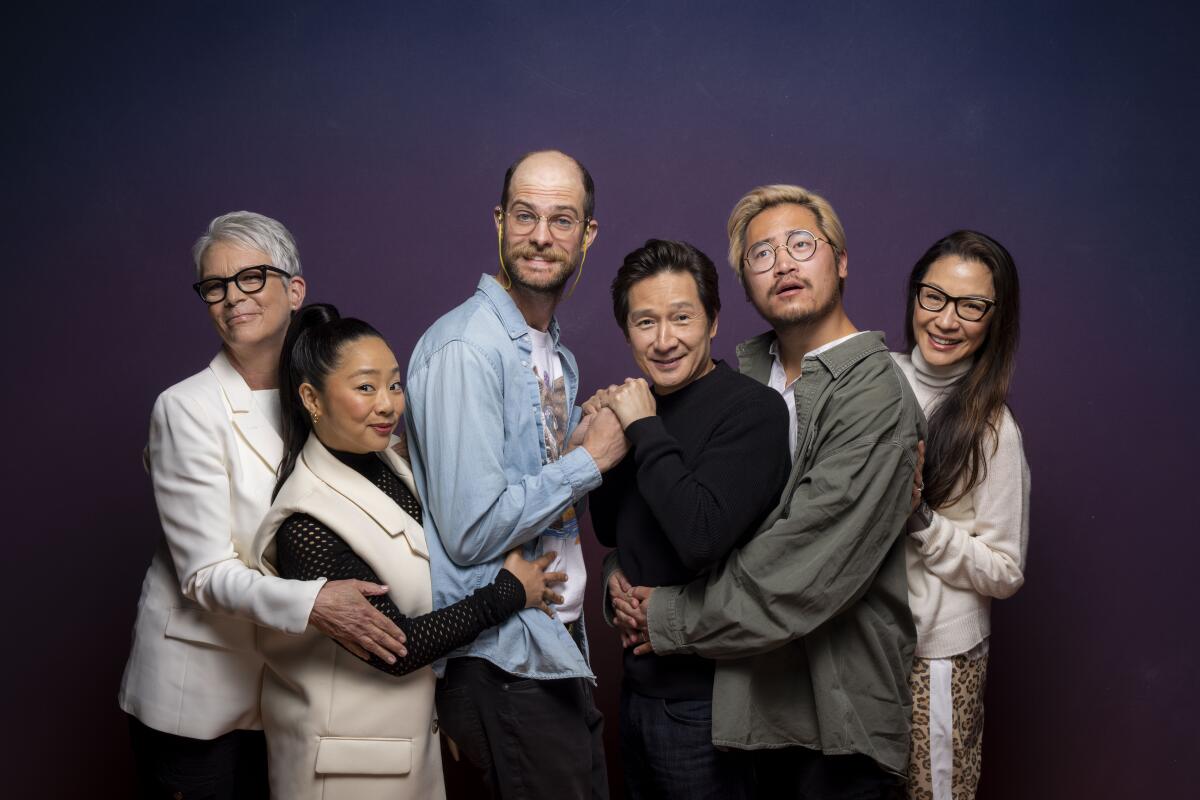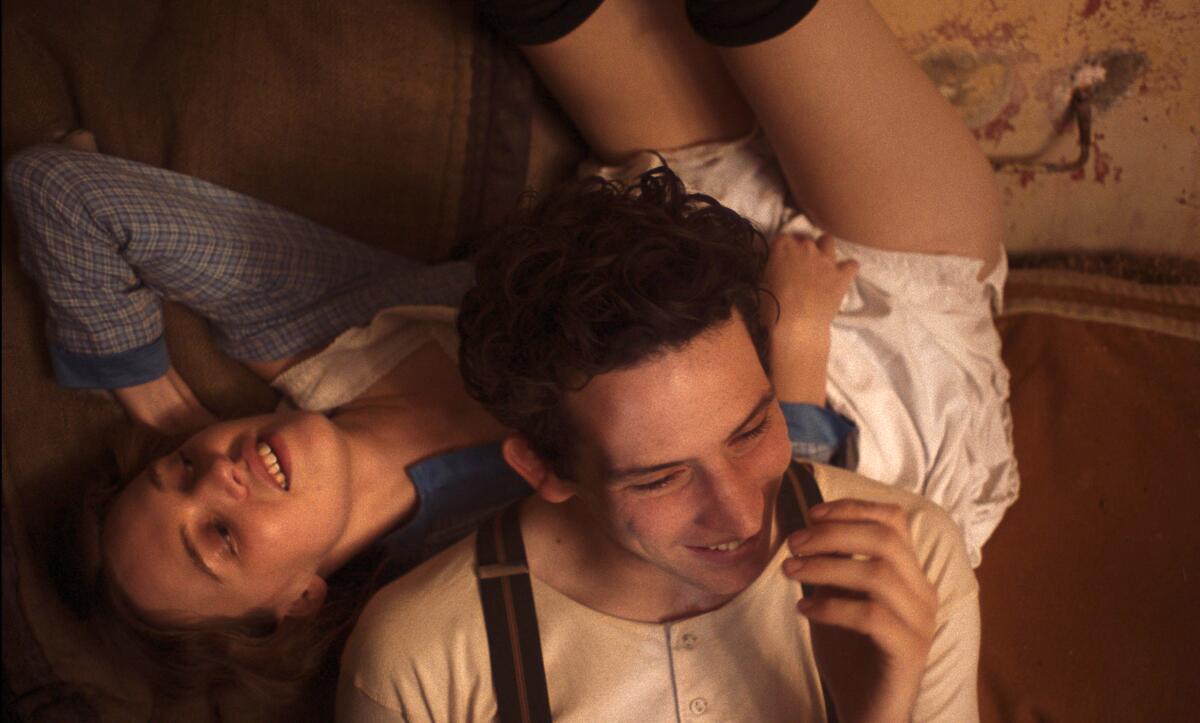‘Everything Everywhere All at Once’ showcases Michelle Yeoh
- Share via
Hello! I’m Mark Olsen. Welcome to another edition of your regular field guide to a world of Only Good Movies.
Only good movies
Get the Indie Focus newsletter, Mark Olsen's weekly guide to the world of cinema.
You may occasionally receive promotional content from the Los Angeles Times.
The Oscars are finally upon us this weekend, bringing to an end months and months of campaigning.
Justin Chang took a strong stance on the announced changes to the show by the Academy of Motion Picture Arts and Sciences, and what they may mean for the organization and the Academy Awards moving forward. As he wrote, “Any academy worth its salt would own its film geekery as proudly as it owns its red-carpet plumage, its strained presenter banter and its tacky musical numbers. It would see its annual telecast as an opportunity to renew and enhance the public’s interest in the art of filmmaking, which means — among other things — giving ample time to the short films and the artists who made them. It means granting at least a few minutes to key cinematic disciplines, like editing and sound, that constitute the often-overlooked building blocks of the medium. It means airing clips from terrific movies like ‘Drive My Car’ and ‘The Lost Daughter’ and ‘Parallel Mothers’ and ‘The Worst Person in the World,’ whose Oscar nominations reflect a level of critical discernment that is precisely the opposite of a blockbuster-first mentality. You could call that elitism; I prefer to think of it as the academy doing its damn job.”
Jen Yamato wrote about an issue that has been hovering over one of the season’s most in-contention films, Paul Thomas Anderson’s “Licorice Pizza.” In a pair of scenes, a man speaks in exaggerated Japanese-inflected English to his Japanese wife. Audiences laugh at the gag, but what is the joke, exactly? As Jen wrote, “Frick’s fetishism of Japanese women may be intended as a cringe-inducing joke at his expense, but it falls flat for viewers who identify more with his wives than with Frick or the film’s protagonists. For some, the discomfort adds a provocative dimension to Anderson’s quasi-nostalgic love letter to the Valley. For others it feels like Anderson playing with explosive ideas but not sticking the landing, or pressing on a bruise with a bit out of step with the rest of the film.”
Josh Rottenberg got into how some of the announced changes to the show — namely presenting eight awards before the live telecast begins — will impact the mechanics of the day. Will people want to be in the theater, or will they mingle on the red carpet? As he put it, “The film academy has thrown a wrench into preparations for the big night: They want everyone to get there early. And in a town that practically invented the concept of ‘fashionably late,’ that’s no small thing.”
The Times reached out to nominees in the acting, directing and screenwriting categories, and nearly all who responded said they planned to be in the theater for that extra hour as a sign of solidarity with those receiving awards.
Ryan Faughnder writes that many of the changes being made strike at a central existential crisis of meaning: “There’s a growing worry that the Academy Awards have become a niche for a passionate crowd as audiences gravitate toward star-studded TV series, video games and TikTok influencers. That, some say, has created an identity crisis” for the academy, whose members vote on the awards.
For a special edition of The Envelope podcast, I spoke to Glenn Whipp, Justin and Mary McNamara about the specifics of this year’s Oscars but also the bigger picture of what the future might hold for the academy. As Mary put it, “I think they reflect the energy level of the culture in general, which is everybody’s trying to figure out how to be, and normal doesn’t feel normal, and there’s a lot of other stuff going on. We got out of a lot of habits, and to a large extent Oscar season is a habit. It’s a cultural habit. And so I think people are also reconsidering, ‘Is this a habit we want to get back into?’ Which is troublesome for a lot of people but not for your average moviegoer.”
Enjoying this newsletter? Consider subscribing to the Los Angeles Times
Your support helps us deliver the news that matters most. Become a subscriber.
‘Everything Everywhere All at Once’
Written and directed by Daniel Kwan and Daniel Scheinert — who work collectively as “Daniels” — “Everything Everywhere All at Once” strives to live up to its title with a story that involves multiple universes, which range from absurd to profound. As Evelyn (Michelle Yeoh) attempts to get through a tax audit of the laundromat run by her family, husband Waymond (Ke Huy Quan) informs her there are infinite possibilities in the world. He begins skipping the two of them from timeline to timeline, one persona to the next, discovering along the way that their daughter, Joy (Stephanie Hsu), is also an evil force known as Jobu Tobacky whom they must defeat. The cast includes Jamie Lee Curtis and James Hong. The film is in general release.
For The Times, Justin Chang wrote, “Running a funny, messy, moving, grotesque, sometimes exhilarating and often exasperating 140 minutes, ‘Everything Everywhere All at Once’ can be a pain and knows it; it might also be its own cure. Crammed with ideas, jokes, laments, non sequiturs and some terrific actors you’ve seen before (if not nearly enough), the movie comes at you like a warm hug wrapped in a kung fu chop: It’s both a sweet, sentimental story about a Chinese American family and a wild, maximalist sensory assault. In the end, its many swirling parts unite around a remarkably coherent purpose: to provide a rare and dazzling showcase for a megawatt performer who scowls, gasps, punches, kicks, leaps, flips, soars and finally transcends. That would be Michelle Yeoh, who has long been one of Asia’s top action stars. … ‘Everything Everywhere All at Once’ is thus a story of redemption and reconciliation, as sweet and sentimental at its core as it is deliriously busy on the surface.”
For the New York Times, A.O. Scott called the film, “an exuberant swirl of genre anarchy,” adding, “The key to ‘Everything’ is that the proliferating timelines and possibilities, though full of danger and silliness, don’t so much represent an alternative to reality’s drabness as an extension of its complexity. … Is it perfect? No movie with this kind of premise — or that title — will ever be a neat, no-loose-ends kind of deal. Maybe it goes on too long. Maybe it drags in places, or spins too frantically in others. But I like my multiverses messy, and if I say that ‘Everything Everywhere All at Once’ is too much, it’s a way of acknowledging the Daniels’ generosity.”
For the New Yorker, Richard Brody wrote, “For all the gyrating action, the movie lacks physicality; the characters don’t seem to be in one another’s presence, their feet don’t touch the ground. The template for ‘E.E.A.A.O.’ isn’t the observation of life from the amplified perspective of imagination; it’s the factitious world of superheroes, adorned with the action of martial-arts movies and the dazzle of effects and gaudy costumes, filled with undergraduate late-night epiphanies and sophomoric humor. … Kwan and Scheinert deprive their characters of identity; the protagonists are universalized, stripped of history and culture, lacking any personal connection to the wider world. With its bland and faux-universal life lessons that cheaply ethicalize expensive sensationalism, the film comes off as a sickly cynical feature-length directorial pitch reel for a Marvel movie.”
For the Wall Street Journal, Amy Nicholson wrote, “Sound complicated? The story is just getting under way. ‘Everything Everywhere’ is an adventure about love and nihilism, immigration dreams and disappointments, scatological humor and talking piñatas, plus a far-flung reality where the entire population has hot dogs for fingers. Over its nearly two-and-a-half-hour running time, the movie’s ambitions double, and double again, as though it’s a petri dish teeming with Mr. Kwan and Mr. Scheinert’s wildest ideas. … Despite their wundercabinet of delights, the filmmakers most want to celebrate human beings in all their contradictions. Each of us, the movie says, is capable of everything.”

‘Apollo 10½: A Space Age Childhood’
Writer-director Richard Linklater’s “Apollo 10½: A Space Age Childhood” is a winsome, nostalgia-tinged look back at a late-’60s suburban Texas childhood as well as a rambunctious, conspiracy-minded lark. Animated in a style similar to Linklater’s earlier “Waking Life” and “A Scanner Darkly,” the film tells the story of 10½-year-old Stan (narrated by Jack Black as the adult Stan) growing up in Houston around the time of NASA’s Apollo missions. Young Stan is recruited and sent into space because the test capsule has been built too small for an adult. The film is playing now in limited release and begins streaming April 1 on Netflix.
For The Times, Noel Murray wrote, “Linklater is working in the tradition of films like Orson Welles’ ‘The Magnificent Ambersons,’ Woody Allen’s ‘Radio Days’ and Federico Fellini’s ‘Amarcord,’ assembling seemingly insignificant fragments of the past into a glittering mosaic, depicting a time now seemingly just beyond reach. … That central premise of ‘Apollo 10½’ does get abandoned, early and often. But the larger point of this movie is that our own pasts sometimes seem like a fantasy — a dream we half-remember — where what actually happened and what we merely imagined both now seem equally impossible.”
For the Playlist, Jason Bailey wrote, “Even at a reasonable 98 minutes, ‘Apollo 10½’ runs a bit long; some may grow exhausted by all of the detailed memories, particularly when he dips back into that territory after the launch to recall the family’s summer fun (drive-in movies, beach visits, Frito pies at the pool, AstroWorld adventures). The jankiness of this structure is a bit much, at least on first viewing, drifting into memoir material for so long that it [leaves] the picture feeling shapeless for a good long while. But then again, that’s our Linklater, and complaining about narrative aimlessness is kind of like coming out of a Scorsese movie bitching about all the voice-over. It’s a new Linklater, is the point, and that’s good news indeed.”
For IndieWire, David Ehrlich wrote, “‘Apollo 10½’ is less compelled by going to the Moon than by remembering what it was like to grow up in its shadow, and the nature of that mission clicks into place once you realize that Jack Black’s non-stop ‘Wonder Years’-esque narration isn’t just table-setting for the movie to come, but actually the whole damn meal. … Linklater’s bittersweet collage might be glued together from the shreds of semi-related memories, but that emphasis on bite-sized moments in time (many of them specific, others more representational) has the satisfyingly counterintuitive effect of slurring them all together into something unreal. As wonderfully recalled as ‘Apollo 10½’ is, Black’s narration, Stanley’s eventual trip to the Moon, and the dreamlike animation that illustrates it in the same vivid style as real life are unified by an idea that Linklater has carried with him since he first picked up a movie camera: To remember the past is to re-imagine it as well.”

‘Mothering Sunday’
Directed by Eva Husson, from an adaptation of Graham Smith’s novella by Alice Birch, “Mothering Sunday” is set in England between the wars and is suffused by a sorrowful air. Yet there is something very much alive in the story of Jane Fairchild (Odessa Young) who works as a maid at a house near where the very wealthy Paul Sheringham (Josh O’Connor) lives. The two of them have a brief but transformative affair. Though the movie belongs to the boldly sensual performances of Young and O’Connor, there are also cameos by Olivia Colman, Colin Firth and Glenda Jackson. The film is in limited release.
For The Times, Robert Abele wrote, “Husson’s commitment to the dreamlike is notable, but the arch framing, careful rhythms and drowsy line readings start to feel like a crutch at a certain point when the emotional thickness in the air begs to be explored in scenes more grounded than elliptical. Nevertheless, ‘Mothering Sunday’ still shimmers with confident filmmaking, fine performances and a belief in the melancholic resonance of a lovers’ sanctuary as something difficult to let go of. Because why would anyone want to?”
Also for The Times, Emily Zemler spoke to Husson, Young and O’Connor about making the film. Discussing a scene where Jane wanders the empty rooms of the Sheringham home, Husson explained its appeal to her. “I had been that girl,” the director said. “I found myself in places I was not supposed to be, walking around naked and just really f—ing feeling the power of my naked body. Just being there. I knew that. I knew that was not going to be creepy or sleazy. And I knew that was not something you see often onscreen: a naked woman walking around books, without it being sexual. And it was not sexual; it was political. I felt, ‘I’ve got to do this.’ That’s the scene that made me want to make the film.”
For the Hollywood Reporter, Leslie Felperin called the film “ a posh package that should appeal to older viewers who swoon for ‘Downton Abbey‘s’ mix of frocks and manners and a younger demographic that likes a more carnal blend of romance and riches, as in Netflix series ‘Bridgerton.’” Felperin added, “It’s flawed, but this may be one of the sexiest heterosexual period dramas in some time.”
For Time, Stephanie Zacharek wrote, “Though Jane cares for Paul, their class differences don’t make her needy or vulnerable. She enjoys sleeping with him, but she isn’t looking to him for longtime fulfillment. She has her sights set on something else: she’s going to become a writer, but that isn’t so much an ambition as a drive that lives deep inside her. … The picture is a bit arty and decorous; it could do with fewer swimmy camera moves. But Young vests it with a fascinating, flinty grace. Never a victim, Jane keeps moving toward what she wants, resilient even in the face of loss. Her life is one big exploration, too far-reaching even for the walls of a grand country manor.”

Only good movies
Get the Indie Focus newsletter, Mark Olsen's weekly guide to the world of cinema.
You may occasionally receive promotional content from the Los Angeles Times.




